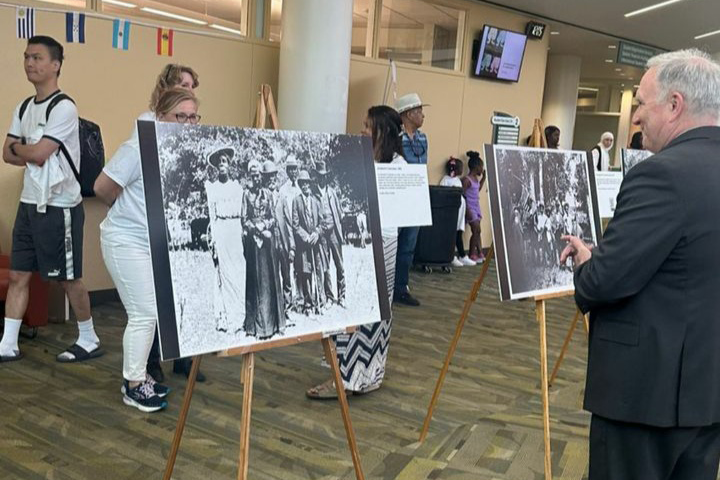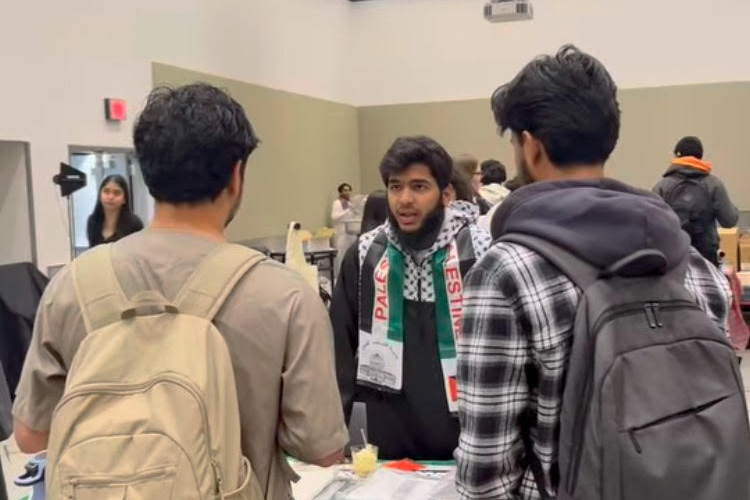A melodic chorus of singers lit up the student atrium at the College of DuPage to celebrate Juneteenth this summer. Juneteenth commemorates the day that news of emancipation was brought to slaves in Texas on June 19, 1865, two years after the Emancipation Proclamation was issued. Varied celebrations have stemmed from that day through the nearly two centuries that followed, as a way for the Black American community to commemorate freedom and overcoming slavery.
Students, faculty and COD community members gathered to commemorate the day, with smiling faces as they enjoyed the choir and the lunch, as well as more serious gestures as attendees read through the educational posters about Black history that were also displayed at the event. This history isn’t just pictures and stories though, it is the actual lives of Black people who live until today.
COD professor, Sam Mitrani, who teaches African American history classes, explained Juneteenth beyond the emancipation of slaves in Texas. The struggles Juneteenth represents have continued through the lynchings of the Jim Crow era, the segregation that ended in the Civil Rights era, up until present-day, where systematic racism leads to overlying issues like mass incarceration and police brutality.
“The historical background of Juneteenth goes beyond simply the final emancipation of slaves in Texas on June 19, 1865, a story you can look up,” Mitrani pointed out. “It evolved into a celebration of the long struggle that had already been waged up to that point against slavery, and of the black culture of survival and mutual support that had already been built by that time and that would continue to be built in the face of Jim Crow and everything that has come since.”
The path against these struggles is illustrated in the life of one Black woman, Opal Lee, an activist and teacher. When Lee was a child in the 1930s, her home in a white-majority Texas neighborhood was set on fire by white rioters. A 2020 article in the Fort Worth Star-Telegram describes Lee’s later reflections on the crime, where she said the following.
“The fact that it happened on the 19th day of June has spurred me to make people understand that Juneteenth is not just a festival,” Lee stated.
From a young age, she became conscious of the layers of racism ingrained in society and the need to overcome it. Lee worked as a Civil Rights activist through the following decades, right up until today. She has long focused on making Juneteenth a federal holiday, Mitrani described.
“In 2016, when she was 89 years old, she marched from Fort Worth, Texas to Washington, DC to ask President Obama to make it a federal holiday, walking two and a half miles in every city along the way,” Mitrani described. “Then during the 2020 protests, at the age of 93, she started a petition to make Juneteenth a holiday, which eventually led to the passage of the law recognizing it. So really, Juneteenth is Opal Lee’s holiday.”
Lee’s life work has certainly made an impact. In the present day, every state in the U.S. either celebrates Juneteenth as a federal holiday or at least marks June 19 as a day of observance. In Illinois, all state employees can take a paid day off on June 19 to commemorate the holiday.
This is significant for workers on a day that commemorates when slavery was finally outlawed, not only for Black people but every person in America. It set a historical precedent for workers’ rights in America, to ensure a person would be paid, and could not be bought and sold or abused. Still, two centuries later, there is work to be done to ensure every working person in the U.S. is given adequate pay and proper working conditions.
“Given that it is a celebration of the end of slavery, it is striking how many workers still don’t get it off,” Mitrani said. “I am sure many working-class people of every race barely registered that it was a holiday as they were going about their normal jobs.”
Currently, 18 states don’t have paid days off for Juneteenth, while the rest have a paid day off for all or some government workers. It’s also a reminder to the American people that at times, the federal holiday can be touted as a symbolic win, without enough concrete changes and improvements made behind it. He pointed to the final push for Juneteenth to become a federal holiday were the protests of 2020.
“Juneteenth would never have become a holiday without the protests of 2020,” Mitrani explained. “But people were not mad about the end of slavery, they were mad about police killing Black people, mass incarceration, and behind that, the persistence of the ghetto. None of those can be changed by adding a federal holiday.”
Learning about Black American history on Juneteenth, celebrating the accomplishments and acknowledging the ongoing struggles is one way to work toward changing this reality. This was realized at the Juneteenth luncheon celebration, where posters marking historic periods and Juneteenth parades including the June 2020 protests for George Floyd. Another critical step is to support Black businesses, like the D.I. Perkins Memorial Chapel Perkin’ group choir which performed at Juneteenth. These are concrete actions COD utilizes as part of the Business Enterprise Program, that seeks to retain the services of businesses owned by minorities, women and disabled people. Students can also support on-campus organizations like the Center for Student Diversity, Equity, and Inclusion, as well as the Black Student Alliance. During Black History Month this year, they organized many events around the theme of Black culture and resistance, which resonates with the symbolism of Juneteenth. The Courier also reached out to David Swope, leader of the Center for Student Diversity, as well as the Black Student Alliance for comment on Juneteenth, but they were unable to respond at this time.
Acknowledging the ongoing injustices, Juneteenth takes on a renewed symbolism of seeking justice and freedom from race-based oppression. Furthermore, it pushes us to look beyond the surface-level actions of supporting anti-racism and diversity. Instead, people can seek to make concrete changes, to put their own actions into an organized effort, as much as Opal Lee continues to do as a woman who, even in old age, marched on the front lines of social change.










Zohaib Quadri • Jul 18, 2023 at 9:13 am
I don’t believe I ever learned more about the history behind Juneteenth than through what I saw during this COD event. The article by itself captures and conveys a thought provoking, inspiring theme then adorns it with a powerful message. I really enjoyed reading this!
Mariyam Syed • Jul 23, 2023 at 7:23 pm
Thank you for reading this article, Zohaib! Glad to hear it was informative and insightful about Juneteenth.